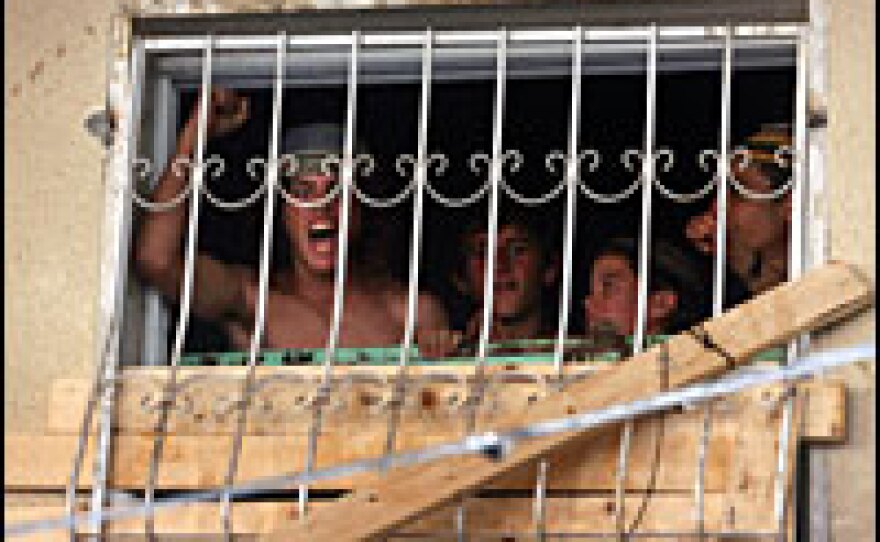
Israeli police arrived early Tuesday morning to forcibly remove hundreds of Jewish squatters who were holed up in the market area of the biblical city of Hebron in the West Bank. They were met with spit, stones, water, oil and cement from the angry settlers who claimed the property rightfully belonged to them.
Hebron, a frequent flashpoint of tensions between Israelis and Palestinians, is home to about 500 Jewish settlers living in heavily guarded enclaves among some 160,000 Palestinians.
Two Jewish families have been squatting illegally in several apartments in the Hebron market for several months. The market has been closed since 1994, when the Jewish militant Baruch Goldstein opened fire in a shrine holy to both Jews and Muslims, killing 29 Palestinians. Settlers have been seeking to re-establish a presence.
The settlers claim the property was owned by Jewish families for decades until Jordanian authorities seized it after the 1948 Israeli war of independence. Israel captured the West Bank from Jordan in 1967.
"This is a crime against justice and against Jewish history," said Noam Arnon, a spokesman for the Hebron settlers. "I am sure we will return. Hebron has a long history and we will return."
Danny Poleg, a police spokesman, said four soldiers, two police officers and two settlers were lightly injured during the evacuation. No arrests were made.
Police forces broke through the fortified apartment doors using bars and metal clippers, carrying the settlers out one by one.
The operation follows the highly publicized refusal of several Orthodox Israeli infantry soldiers to take part in the evacuation.
On Monday, the army made clear it would not tolerate any form of mutiny and sentenced a dozen of the soldiers, including two commanders, to brief terms in jail.
The rebellion reflects a growing schism between the army command and Jewish settlers, many of whom serve in combat units. Tensions have been high since Israel unilaterally withdrew from the Gaza Strip in 2005, forcibly removing its 9,000 settlers. Last February, soldiers clashed with settlers again when they uprooted part of the illegal West Bank outpost of Amona.
Meanwhile, Palestinian President Mahmoud Abbas said that Israel has promised solutions for many of the day-to-day concerns of Palestinians in Israeli-controlled areas.
Abbas and Israeli President Ehud Olmert met for three hours in the West Bank town of Jericho on Monday, and both said they talked about fundamental issues that are to pave the way toward Palestinian statehood. Olmert promised Abbas that negotiations on a final peace deal would start soon.
The two leaders also talked about easing the lives of Palestinians, including the removal of Israeli army roadblocks and the release of Palestinian prisoners.
"After this meeting, I can say that many of the daily issues that concern the Palestinian people will find a solution," Abbas said.
Olmert was the first Israeli leader to visit a Palestinian town after seven years of bloody fighting, and Israeli and Palestinian security forces worked together to protect him, blocking all access to the five-star hotel in the biblical oasis of Jericho where the meeting took place.
The Palestinians say that after years of delay, it's now time to start talking about the terms of Palestinian statehood, including final borders, removal of Israeli settlements and how to divide Jerusalem.
Israel wants to move ahead more slowly, in part because previous talks in 2000 collapsed over the so-called core issues and because Olmert may not be strong enough politically to make far-reaching concessions.
However, the U.S. has been prodding both sides to make progress, ahead of a Mideast peace conference in the U.S. in November. Olmert also appears eager to prop up the moderate Abbas, particularly after the Islamic militant Hamas seized Gaza by force in June, routing the forces loyal to the Palestinian president.
From NPR reports and The Associated Press.
Copyright 2022 NPR. To see more, visit https://www.npr.org. 9(MDAzMjM2NDYzMDEyMzc1Njk5NjAxNzY3OQ001))





